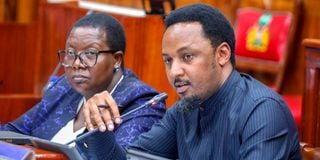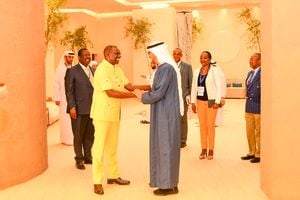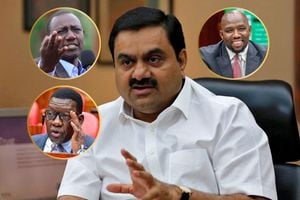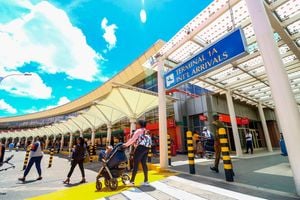
Chairman of the Senate Committee on Roads, Transport and Housing Karungo Thangwa and Deputy Chairman Peris Tobiko during the sitting at County Hall Nairobi on September 13, 2024. Transport Cabinet Secretary Davis Chirchir appeared before the committee to answer questions on the Adani-JKIA deal.
A silent but consequential fight has emerged as at least four parliamentary committees begin probes on multi-billion-shillings deals Indian conglomerate Adani Group is eyeing in various sectors of Kenya’s economy. This has triggered accusations and counter-accusations between the Senate and the National Assembly, and within the committees themselves, over who should lead the scrutiny.
In the National Assembly, the Public Debt and Privatisation Committee; Public Investments Committee on Commercial Affairs and Energy; and Transport and Infrastructure committees are all on just one aspect of the Adani deal: The Sh230 billion proposal for a 30-year lease of the Jomo Kenyatta International Airport (JKIA).
In the Senate, the Roads, Transportation and Housing committee is also probing the same JKIA matter.
It is expected that more committees will be involved in the Adani matters in the coming weeks after the revelation that the Indian conglomerate also had interests in the Sh104 billion Integrated Healthcare Technology System plan to actualise the Social Health Authority, which also includes telecommunications giant Safaricom, Abu Dhabi firm Apeiro Limited and Konvergenz Network Solutions Limited.
At the same time, Adani is seeking to recoup Sh634.7 billion ($4.92 billion) over the next 30 years from building power transmission lines in Kenya should its proposal be accepted by the Kenya Electricity Transmission Company (Ketraco).
In its counterproposal however, Ketraco wants to hand Adani an annual revenue of $104.48 million (Sh13.48 billion) per year, which translates to $3.134 billion (Sh404.33 billion) over the 30-year period.
These deals could also attract parliamentary scrutiny, further increasing the committees involved in the Adani deals’ probe.
While there might be nothing stopping each of the committees in pursuing the matter, MPs and members of the committees have themselves started raising questions on the prudent expenditure of public resources in investigating the same matter separately.
Forensic audit
The Public Investments Committee on Commercial Affairs and Energy has already called on Auditor-General Nancy Gathungu to do a forensic audit on the Adani-JKIA deal and present its report by the end of October.
In the forensic audit, the Pokot South MP David Pkosing-led committee has directed Ms Gathungu to ascertain the estimated figure of upgrading the airport, and how the 1.83 billion US Dollars (Sh230 billion) as the cost of the improvements was arrived at.
The committee also wants the auditor to ascertain the scope of the package in terms of building a new terminal and a second runway.
MPs also want auditors to find out what would be the best way to identify a private sector and whether a privately initiated investment proposal was the best route.
The lawmakers also want auditors to establish how the arrangement affects the other airports and aerodromes which depend on JKIA for survival.
Further, the committee also wants auditors to assess how the private manager will work with the national airline and what happens with KAA staff across the entire country.
Mr Pkosing has since dismissed the Senate probe on the matter terming it an exercise in futility.
“Where will they take their report? Who will act on it?” he asked.
“Reports from the National Assembly are actionable. Upon adoption by the House, they are taken to the relevant ministry for implementation failure to which the committee on implementation takes over the matter. What about the Senate?” he said.
He added that the Senate has no teeth to bite and its committees are trying to flex muscles which they don’t have.
“They have no muscles to flex and they have no teeth to bite. So what exactly are they doing?” Mr Pkosing, the Pokot South MP, asked.
Kitui Central MP and vice chairman of Public Debt and Privatisation Committee Makali Mulu said the matter falls under their committee and that of transport.
Mr Mulu said it looks disorganised if committees of parliament are conducting parallel investigations on one matter asking what happens if there are different recommendations.
“It does not look organised and gives parliament a bad picture if we are conducting a parallel probe over the same matter unless there are vested interests which could be very unfortunate,” Mr Mulu said.
He said the matter cannot be considered by the commercial affairs committee since it has not reached the financial stage and there is no audit report on it.
“This is a private-public partnership which falls under our committee and that of transport. So the speaker should give directions for a joint sitting between the two committees so that we appear organised,” Mr Mulu said.
Gatanga MP Edward Wakili Muriu said the Senate has no role on the Adani issue saying someone needs to go to court to block them from continuing with the probe.
“Senate has no role on national issues, their work is to oversight counties. What they are doing on the matter of Adani is usurping the powers of the National Assembly,” Wakili Muriu said.
“The Senate should wait for matters such as sharing of revenue, otherwise, what they are doing is overreaching on their mandate,” he added.
Appearing before the public debt and privatization committee on Tuesday over the Adani deal just a day after facing the Senate committee on transport over the same subject, treasury Cabinet Secretary John Mbadi urged the committee to consider having a joint sitting over the matter.
“Maybe the committees can have a joint sitting because what happens now if different committees come up with different recommendations w? Which one will be implemented?” he asked.
But senators have rejected their fellow parliamentarians’ arguments that they should not conduct the probes.
Four committees
Kisii Senator Richard Onyonka, however, said it does not matter which committee handles the issue, saying parliament as an institution have an oversight role.
“We should not start fighting over which committee has a mandate over this, otherwise we will waste time chasing the squirrels and lose focus on the main issues,” Mr Onyonka said.
He, however, said there is need for all the four committees to form a joint task force and adequately address the Adani deal issue.
“The National Assembly and the Senate should sit together and decide which committees will add value to this probe. Otherwise, why is there duplication of duties and wastage of public funds? He asked.
Makueni Senator Daniel Maanzo said both houses have a role in resolving matters that affect the community.
“This Adani decision by the government can be probed by either house. The two houses have a role in handling matters that touch on communities. The Senate comes in because it affects a county,” Mr Maanzo said.
Under Standing Orders, the Public Debt and Privatization Committee is tasked with oversight of public debt and guarantees, examining matters relating to debt guarantees by the national government, oversight of consolidated fund services excluding audited accounts, examining reports on the status of the economy in respect of the public debt
In addition, the committee also oversees public-private partnership programs by the national government with respect to public debt and oversight privatization of national assets.
On the other hand, the Pkosing-led team on Public Investments Committee on Commercial Affairs and Energy established under Standing Order 206 (A) is responsible for the examination of the working of public investments based on their audited reports and accounts in the sectors of energy, environment, and general economic and commercial affairs.
In carrying out its mandate, the committee is to examine the audit reports in the context of the autonomy and efficiency of the public investments by checking whether the affairs of the public investments are being managed in accordance with sound financial and prudent commercial practices.
The National Assembly Transport Committee, established under Standing Order 216 (5), is largely responsible for investigating, inquiring and reporting on all matters relating to the management, activities, administration, operations and estimates of the assigned ministries and departments.
The Senate Committee Roads, Transportation and Housing, which is established under standing order 228 (3), is mandated to consider all matters relating to transport, roads, public works, housing, construction and maintenance of roads, rails and buildings, seaports and communication.









